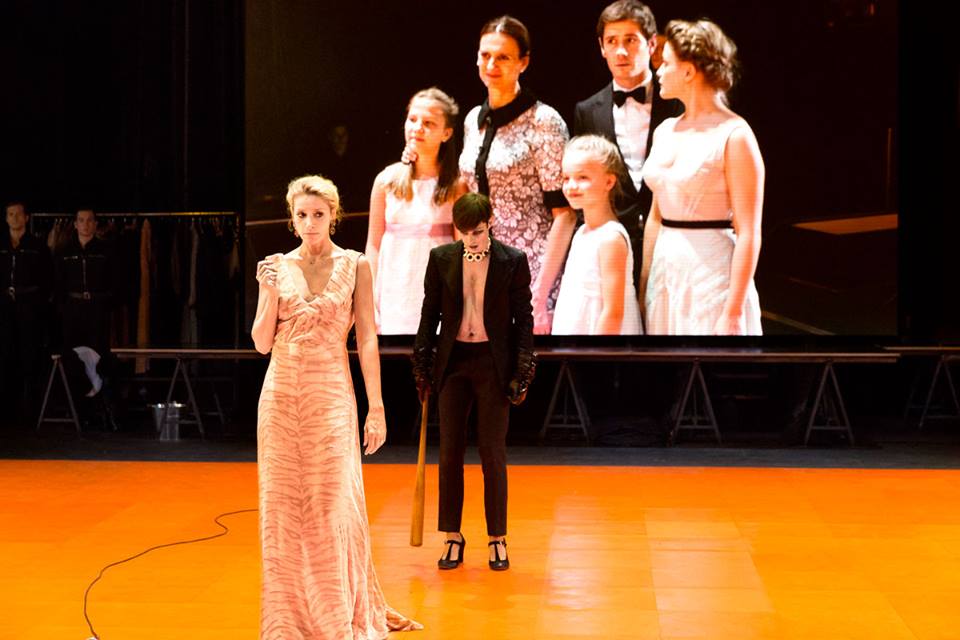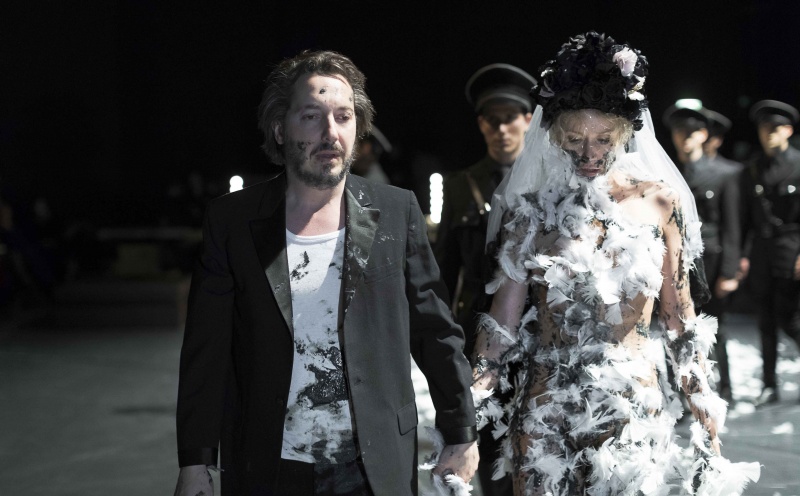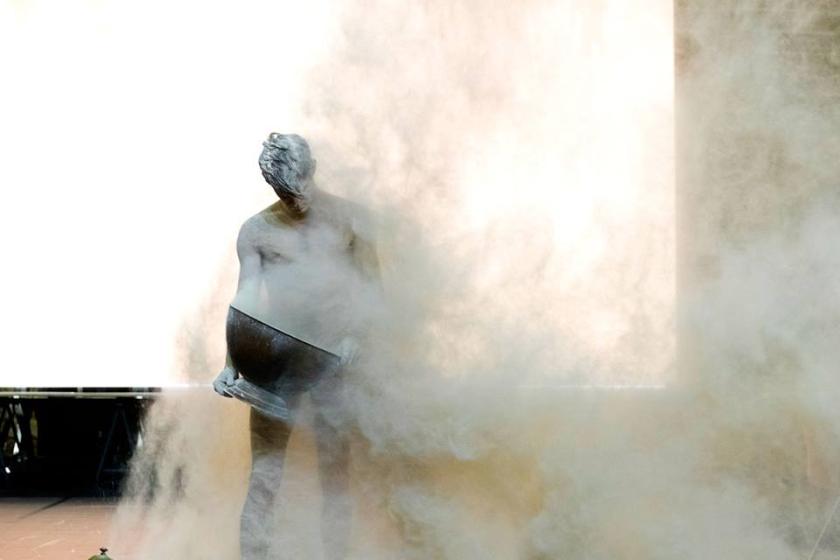Is the terrifying past of Germany in 1933 also our future? Having had nightmares about the brilliant dystopian TV soap opera Years and Years, which built like all the best of its kind on present fears, I wasn't expecting to be confronted so soon by another pertinent disaster drama. In a sequence of all too unforgettable theatrical images, Ivo van Hove finds the present and the future in the pith of Visconti's's discomfortingly luxurious 1969 fantasia about a family which turns into a 1930s House of Atreus under pressure from the newly ascendant Nazi party.
Visconti's Italian title was La caduti degli dei, a reference to Wagner's Götterdämmerung or Twilight of the Gods. But the gods are already annihilated when family members and supposed friends gather to celebrate the birthday of industrialist Joachim von Essenbeck. With its vast orange floor reflecting the steelworks Visconti portrays in his opening credits, Jan Versweyveld's set has dressing room tables and seating areas on the sidelines: van Hove, determined not to offer us an adaptation of the film any more than he did in his superb re-imagining of Bergman's Persona as twinned with After the Rehearsal, removes most of the realism and favours stylised ritual.  A hand-held camera goes round capturing the inner lives of the characters in close-ups on faces - unlike Visconti, who shows us the reactions of each person present at the musical entertainment early on, the focus here is entirely on the doomed, compromising patriarch - but time and again a big and frightening world intrudes, swallowing up these petty and unlovable creatures. With each murder lights go up on the audience, an apocalyptic tam-tam is sounded, the character in question walks towards an open coffin escorted by timelessly costumed men in black and is then filmed soundlessly screaming inside when the lid is down while the further decline of the individuals left proceeds apace. It's devastating and almost unbearable to watch: a symbolic substitute for the increasingly empy places at Visconti's lavish dinner table.
A hand-held camera goes round capturing the inner lives of the characters in close-ups on faces - unlike Visconti, who shows us the reactions of each person present at the musical entertainment early on, the focus here is entirely on the doomed, compromising patriarch - but time and again a big and frightening world intrudes, swallowing up these petty and unlovable creatures. With each murder lights go up on the audience, an apocalyptic tam-tam is sounded, the character in question walks towards an open coffin escorted by timelessly costumed men in black and is then filmed soundlessly screaming inside when the lid is down while the further decline of the individuals left proceeds apace. It's devastating and almost unbearable to watch: a symbolic substitute for the increasingly empy places at Visconti's lavish dinner table.
Coldly confounding, too, are many of the Comédie-Française actors' unifying performances (Visconti had a mostly very - overly? - beautiful international cast, awkwardly dubbed into Italian). Christophe Montenez takes the original Helmut Berger role of Martin, the dysfunctional heir to the steelworks who starts out amoral but indifferent to the world around him and ends up the persecutor. Sans the original drag as Marlene Dietrich in The Blue Angel, van Hove gets him to make the cabaret number more dangerous; later the camera catches the demonic intent of his paedophilia very disturbingly. Éric Génovèse's von Aschenbach - Wolf by name, wolf by nature, the polar opposite of Mann's Gustav - is quietly lethal against the occasional shoutiness of some of the other performances (Elsa Lepoivre's Lady Macbethesque Sophie, pictured above with Montenez and below with Guillaume Gallienne as Friedrich Bruckmann, does it best).  Music is a constant feature in this van Hove production, as in many others; he discards the film's Bach Sarabande played on the cello in favour of an original composition by sound master Eric Sleichem on bass clarinet, quoting that famous compromiser Richard Strauss, and fascist violence blasts us to the deafening strains of the German rock band Rammstein - appropriate heavy metal given the work on which the family's fortunes are built. Four saxophones play somehow even scarier original music near the end of the drama.
Music is a constant feature in this van Hove production, as in many others; he discards the film's Bach Sarabande played on the cello in favour of an original composition by sound master Eric Sleichem on bass clarinet, quoting that famous compromiser Richard Strauss, and fascist violence blasts us to the deafening strains of the German rock band Rammstein - appropriate heavy metal given the work on which the family's fortunes are built. Four saxophones play somehow even scarier original music near the end of the drama.
Sound and vision reach a zenith of invention in what Visconti called his "intermezzo musicale", the doomed patriarch's son Konstantin (Denis Podalydès) going berserk with his buddies in the SA (Sturmabteilung, the Nazi paramilitary) in a gay orgy before the massacre on the Night of the Long Knives. The two figures on the stage are seemingly reflected on a screen which adds other men stripping off, filmed nightmarishly from high above.
The length of this particular assault on the senses is part of the point. Yet though the ideas and performances never become boring, and van Hove's sense of structuring is more impressive than Visconti's, his total of two hours and ten minutes without an interval feels more like three. Coincidentally, that was also the running time of Musorgsky's original Boris Godunov in Richard Jones's Royal Opera production the previous evening, but time passed far more quickly. These are two great directors with different approaches. Jones pares away and tells the story clearly without any of van Hove's need for explanations (even with the family members labelled and identified, you can still lose track of who's who in The Damned). The Belgian genius, though, is epic in his multimedia, slow burn. You leave the theatre stunned, and that doesn't happen in London often enough.















Add comment